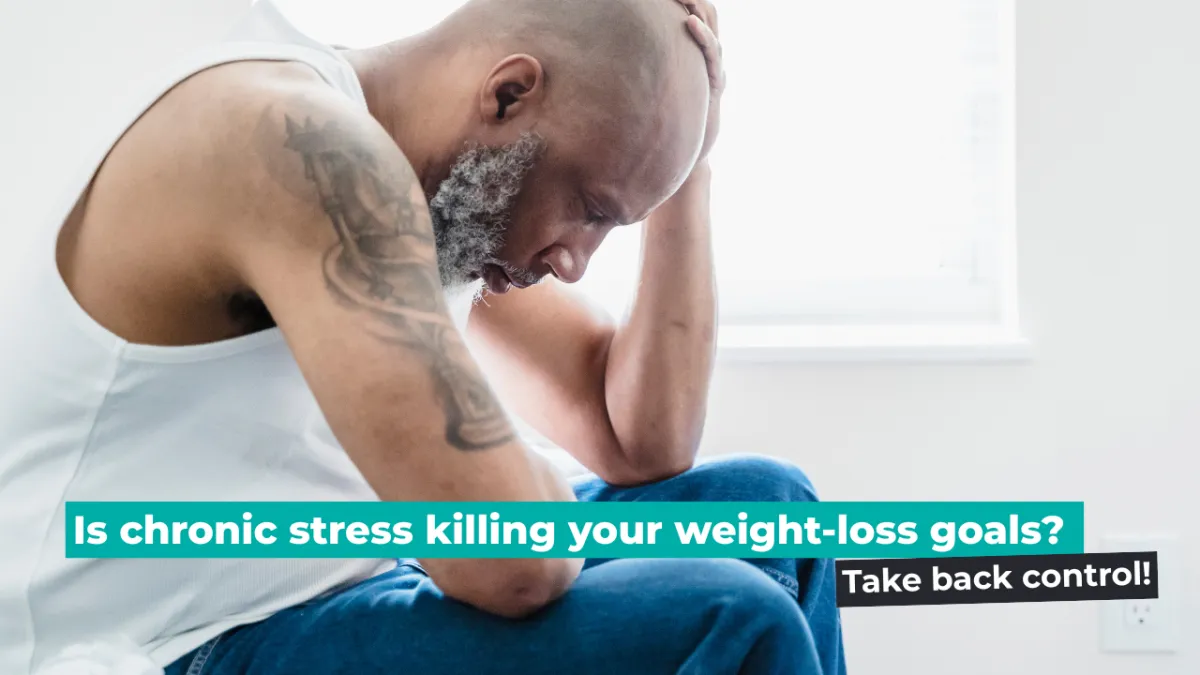
The PrimeFit Journal
Health, strength and mindset coaching for midlife professionals.
Whether you’re over 40, managing a condition like Type 2 diabetes or PCOS, or simply training with more purpose, this is your evidence-based resource for building real strength and lasting energy—without gimmicks or overwhelm. I’m Rob, a personal trainer and nutrition coach, and I use this space to help you live better through smart, sustainable choices.

Why Chronic Stress Might Be Blocking Your Weight Loss Efforts – Even If You're Doing Everything Right
Ever feel like you're doing everything right—eating well, exercising regularly—but still hitting a wall with your weight loss goals? You're not alone. For men and women in their 40s and 50s, the real culprit could be something hiding in plain sight: chronic stress.
Stress: Your Silent Weight-Loss Saboteur
You're juggling a demanding job, managing family responsibilities, maybe even squeezing in a social life—stress seems like a given. But here’s the kicker: stress doesn’t just make you feel worn out; it actively fights against your weight-loss efforts. How?
When stress becomes chronic, your body floods with cortisol—the notorious "stress hormone." Cortisol isn’t inherently bad; it's essential for managing short-term threats (think running from a sabre-toothed tiger). But in modern life, this stress rarely lets up, and consistently elevated cortisol starts doing some serious damage.
Firstly, cortisol boosts fat storage—especially around your abdomen. Yep, that stubborn belly fat isn’t just about extra calories; it's literally being fuelled by stress hormones. That's why even those meticulously planned meals and sweat-drenched workouts sometimes feel fruitless (Harvard Health, 2021).
How Stress Hits Men and Women Differently in Midlife
Men and women experience stress differently, particularly during midlife. For men, chronic stress often increases visceral fat around the waist, raising the risk of cardiovascular issues and diabetes. Additionally, stress can negatively affect testosterone levels, impacting energy, mood, and muscle mass.
Women, meanwhile, face unique hormonal shifts—especially perimenopause and menopause—which compound the effects of chronic stress. Elevated cortisol interacts with declining oestrogen levels, intensifying emotional symptoms like anxiety and mood swings and making fat loss significantly harder. Many women also report disrupted sleep and heightened cravings, often leading to increased weight gain around the hips and abdomen.
The Double Whammy of Midlife
There's another dimension to this as you hit midlife. Your body naturally becomes less efficient at managing stress and balancing hormone levels, meaning stress hits harder and sticks around longer. It's not just about mental overwhelm—chronic stress messes up your sleep quality, ramps up unhealthy food cravings (particularly those late-night snack raids), and zaps your motivation to exercise (American Psychological Association, 2018; Yau & Potenza, 2013).
But here's the empowering news: stress isn’t inevitable. It's manageable.
Taking Back Control: Stress Management Made Simple
You can't always dodge life's curveballs, but you absolutely can control how you respond. Mastering this one skill can become your game-changer, putting you back in the driver’s seat. Here’s how:
1. Pause, Breathe, and Choose Your Response
Sounds simple, right? But this isn't some fluffy mindfulness cliché—this is backed by solid science. When stress hits, pause for just a few seconds and take a deep breath. Ask yourself: "What's one useful action I can take right now?" This quick reset can significantly lower your stress levels and get your cortisol back under control (Brown & Ryan, 2003).
2. Get Fierce About Boundaries
In our always-connected world, clear boundaries are crucial. It’s not just okay to draw a line between your work and personal life—it's necessary. Let people know when you're off-duty without feeling guilty. Protect your downtime like it’s sacred (because it is). This habit can drastically reduce stress, boost mental clarity, and give you the energy you need for those all-important workouts (Kossek et al., 2012).
3. Stop Dwelling, Start Solving
Worrying is human—but endlessly replaying worries is like playing a broken record that never resolves itself. Instead, break your worries down into manageable steps. Solve problems rather than marinating in them. You’ll quickly regain control, cutting your stress levels and boosting your confidence (Folkman & Moskowitz, 2004).
Turn Stress into Your Strength
Here's the thing: managing stress doesn't mean never feeling it. It means developing a toolkit to respond effectively so stress no longer sabotages your goals. Imagine what happens when you replace constant anxiety with calm confidence. Not only will you finally break through your weight-loss plateau, but you'll also enhance your overall wellbeing, energy levels, and quality of life.
That's why stress management is a cornerstone of my PrimeFit programme—it's about addressing the root causes holding you back. It's more than just fitness and nutrition; it’s about reclaiming your life.
Ready to Break Free?
If stress is standing in your way, you're not alone—and you don't have to tackle it alone either. The PrimeFit programme is specifically designed to help men and women in their 40s and 50s overcome these barriers, unlock their potential, and finally see results.
If you're ready to make stress work for you, not against you, visit edefitness.com to schedule your personalised consultation. Because real fitness starts when stress stops calling the shots.
References
American Psychological Association. (2018). Stress and sleep. https://www.apa.org/news/press/releases/stress/2018/sleep
Brown, K. W., & Ryan, R. M. (2003). The benefits of being present: mindfulness and its role in psychological well-being. Journal of Personality and Social Psychology, 84(4), 822-848.
Folkman, S., & Moskowitz, J. T. (2004). Coping: Pitfalls and promise. Annual Review of Psychology, 55, 745-774.
Harvard Health Publishing. (2021). Understanding the stress response. https://www.health.harvard.edu/staying-healthy/understanding-the-stress-response
Kossek, E. E., Ruderman, M. N., Braddy, P. W., & Hannum, K. M. (2012). Work-nonwork boundary management profiles: A person-centered approach. Journal of Vocational Behavior, 81(1), 112-128.
Yau, Y. H., & Potenza, M. N. (2013). Stress and eating behaviors. Minerva Endocrinologica, 38(3), 255-267.
Copyright 2025 Ede Fitness, All Rights | Privacy Policy | Terms & Conditions

